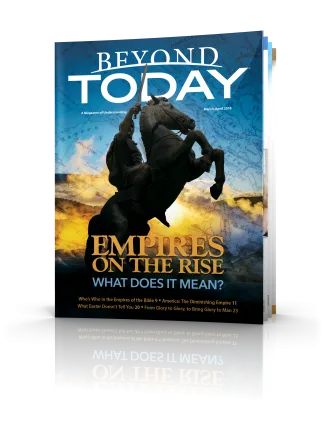What Easter Doesn’t Tell You

Do Easter traditions leave something missing in the story of Jesus Christ? What is it that Easter doesn’t tell you about Christ’s life, death and resurrection?
This may sound shocking to you, but did you know that Easter as a celebration has nothing to do with Jesus Christ?
The name itself does not mean “resurrection of Christ” like you may believe. The word Easter actually comes from the name of a goddess of fertility, spring and the dawn worshipped in ancient times. You can go online and quickly learn the origins of Easter bunnies, colored eggs, hot cross buns and the sunrise service. You’ll find these modern parts of the Easter celebration come from ancient pre-Christian religions. They were around a long time before the time of Christ, and they have nothing to do with biblical practice or the Church!
Maybe that doesn’t matter to you. Maybe you believe it’s okay to incorporate these things as part of the worship of Christ. But let me show you from God’s Word why you should rethink the observance of Easter.
Warnings in the early Church
The Church Jesus founded had a very clear understanding of who He was and how to worship Him. But over many decades things changed. Increasing numbers of Christians became confused during this period and lost many aspects of earlier teachings.
How could people possibly let that happen? It’s a sad fact that we have a natural tendency to forget the things we learn. Early Christians learned their true faith by the teachings of Christ and the apostles. But very early, as we can tell from the writings of the apostles to the early Church, heresy reared its ugly head. False teachings began to creep into the Church.
Paul warned the Church members in Asia Minor (modern-day Turkey) that they were flirting with a false gospel (Galatians 1:6). The apostle Peter warned that false teachers among the Christians would “secretly bring in destructive heresies, even denying the Lord who bought them” (2 Peter 2:1, emphasis added throughout).
Gradually, through the years after the death of the original apostles, other teachings began creeping into the Church. Among these false teachings was a distortion and corruption of the truth about the death and the resurrection of Jesus.
Again, Peter warned Church members that there was a danger of “denying the Lord who bought them.” He warned against replacing the clear truth of Jesus Christ with pagan myth and false teaching. Yet in spite of Peter’s clear warning, people bought into the denial.
So, what does all this have to do with Easter?
Easter evolved from a story based on an ancient Babylonian god named Tammuz. The story of Tammuz is at the heart of the pagan world—and at the heart of Easter. It’s a story of a never-ending circle of life without meaning, direction or purpose. The ancient Babylonians believed that Tammuz died every year and that spring showed his “resurrection” by a goddess named Ishtar.
The word Easter ultimately derives from the name of this ancient false goddess. Her worship was very popular, and spread far and wide from Babylon to other regions of the ancient world. A lot of modern Easter customs come directly from the way ancient people worshiped Ishtar.
Why and how did this happen?
People had been believing the Ishtar myth and other stories for centuries. In the decades following Jesus and the apostles, as Christianity spread out from the Holy Land, local people started blending these myths into the true gospel story of Christ. Eventually, the fake stories replaced the true one.
The Church began to be corrupted by such false teachings.
It wasn’t long before leadership at that time found it convenient to blend pagan myths into biblical truth to attract more people to the church, a practice known as syncretism, so they could hold power over them. It is a recurring story told often in the Bible.
The myths of Tammuz and Ishtar and of other pagan gods are meaningless when it comes to salvation and what God is really doing with human life. Only God coming to live in the flesh could open the door of salvation for the human creation. Borrowing from false pagan myths to create a Christian story does not work. It is empty, futile tradition.
Yet every year people celebrate with parades and Easter sunrise services. In America the observance is so popular that Easter egg rolling takes place annually on the White House lawn.
People dress in their finest, and for many this is one of perhaps two or three times a year they actually go into a church for a formal service. Easter services around the world are major events. Coupled with Good Friday, it becomes a long weekend of leisure, church attendance and festivity.
What’s missing in Easter
You may think, “All this background really doesn’t matter because I do it to honor God.”
But it does matter. Something is missing in this story. What’s missing is truth! What’s missing is understanding the way to eternal life through Jesus Christ, the Son of God!
Christ came in the flesh and showed us how we may enter the Kingdom of God—through His death and His resurrection. He made possible the most awesome reality—the potential to become God’s own children in the family of God, entering eternity crowned with infinite glory and honor.
This is the heart of the Bible’s message to mankind. Jesus Christ tasted death for every man so that God might give eternal life to those who call on His name. Christ said those who worship Him will do so in spirit and in truth (John 4:24).
Do you want to do what Jesus said? Then you need to learn what’s missing in the Easter holiday.
You may be surprised to learn that Easter is not even found in the New Testament story of Jesus and His followers. (The word occurs in the King James translation of Acts 12:4, but other versions correctly translate this as Passover.) The book of Acts, which tells the story of the apostles and the Church in its first decades, has no account at all of Easter. The apostles constantly preached the resurrection of Jesus Christ—but they put it in the context of the biblical festivals they already knew and observed.
These festivals were central to the life of the Church of God in the first century. As recorded in Acts 2:1, the Church was founded when? When Christ’s disciples were gathered on the day of Pentecost, also known as the biblical Feast of Weeks. Later in Acts, Luke referenced key events taking place during the Days of Unleavened Bread (Acts 20:6). Another festival, the Day of Atonement, is also mentioned in Acts (Acts 27:9). The weekly Sabbath is also featured several times, with the apostle Paul going into synagogues to preach to Jews and gentile (non-Israelite) converts (Acts 17:2).
On one occasion, Paul told the church in the Greek city of Corinth, a heavily gentile congregation, to keep the Feast of Unleavened Bread (1 Corinthians 5:8). He said to keep these days with “the unleavened bread of sincerity and truth.” God had revealed all of these feasts to His people centuries earlier—repeatedly emphasizing that these were His feasts (see Leviticus 23).
In contrast, Easter celebrations were nowhere in the picture during the early days of the Church—except in prototype among the repugnant practices of the surrounding pagan world.
However, the death and resurrection of Jesus Christ as found in the Bible certainly was in the picture. Christ’s death and resurrection is clearly connected with the Passover and the Feast of the Unleavened Bread. Jesus was killed as “our Passover” (1 Corinthians 5:7). He was buried just as the Days of Unleavened Bread began in that year and remained buried for the first three days and three nights of the seven-day festival to then be resurrected in the midst of it. He then appeared to the disciples the morning after His resurrection, and it was on that day, of a special firstfruits offering during the feast, that He was accepted by the Father as the firstfruits of salvation.
All this was clearly understood by the Church. It was part of the apostles’ doctrine or teaching in the early days. Celebrating Easter was not part of the story.
What Easter doesn’t tell you is that by celebrating a substitute holiday that originated in pagan myths, you are missing out on the wonderful meaning of Passover and the death and reconciliation of Jesus Christ. Jesus suffered, died and was resurrected once for all time so that men might have opportunity to enter into eternal life. Easter obscures the truth about that.
What do you need to know?
You need to know that Christ died according to the Scripture as our Passover Lamb, in fulfillment of the many biblical prophecies that foretold His coming, His suffering, His death and His resurrection.
You need to know that the Passover observance and symbols, instituted by Christ the night before He died, teach us about the need for a Savior who gave His life for us and, having been resurrected, lives again in us that we might have eternal life.
You need to know that the Days of Unleavened Bread show our old sinful self buried with Christ as well as our being risen to new life with Him—the life of the resurrected Christ and His power in us today (see Romans 6). It is this festival that Paul taught the gentile world to observe. This Festival of Unleavened Bread is what you can observe today to realize the full meaning of the life, death and resurrection of Christ.
You need to know that Easter misses all of this vitally important truth about Jesus Christ!
The hope of life through Christ
Paul said in 1 Corinthians 15:19 that without Christ’s resurrection we are of all people most miserable. The resurrection must be presented truthfully, according to what the Bible reveals. There is no room for error and myth in this most important event. Look at what you know, or what you think you know, about the resurrection. The truth about the resurrection is a key to opening a relationship with Jesus Christ and the Father based on reality.
Paul said, “But now Christ is risen from the dead, and has become the firstfruits of those who have fallen asleep” (1 Corinthians 15:20). Because Christ was resurrected from the dead and lives today, you have assurance that you too can enter eternal life. No humanly devised holiday can tell you what God says through His Holy Days. You need to educate yourself with the full story.
What does Easter not tell you? It fails to tell you the true path to eternal life through Jesus Christ the Son of God. Easter is based on a false myth of a deity who died and rose year after year with no connection to a hope of immortality for mankind. Blending the truth of Christ’s resurrection with such a myth turns the truth of God into a lie. Easter, with its traditions rooted in pagan myths, is a lie.
We challenge you to look into your Bible to see what God tells us about the life, death and resurrection of Jesus Christ. Instead of celebrating a holiday rooted in myth, why not keep the festival God gives us—a festival that explains the death and resurrection of Jesus Christ in its entirety and how that applies to us—a festival that explains the victory of life over death!







